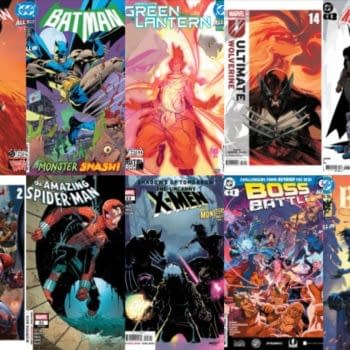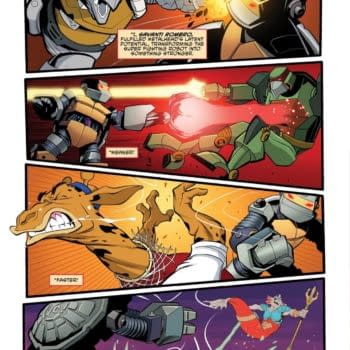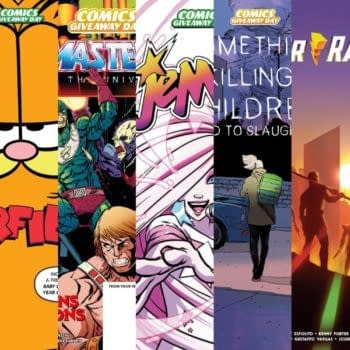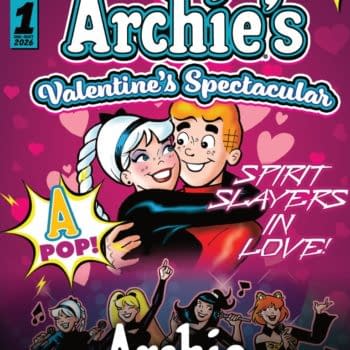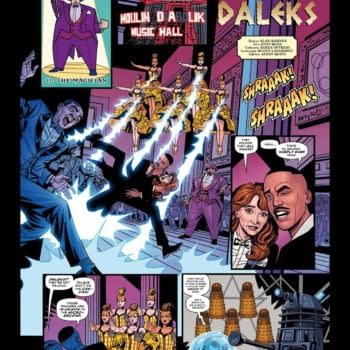Posted in: Comics | Tagged: Comics, dynamite, entertainment, Fabrice Sapolsky, flash gordon, Jesse Hamm, Kings Cross
Jesse Hamm Talks With Fabrice Sapolsky About Flash Gordon: Kings Cross #5
Dynamite has sent us a new Writer-2-Writer interview featuring Fabrice Sapolsky, writer of Intertwined #5, talking to artist/co-writer Jesse Hamm about Flash Gordon: Kings Cross #5, both on sale now. Cover and interiors by Hamm and Grace Allison.

JESSE HAMM: I think the "disembodied head" narration may have been Jeff Parker's suggestion…but, like Jeff, I enjoy comics from every era, so I tend to grab whatever storytelling tool seems to best fit the needs of a scene. We don't see many of those talking heads in modern comics…but for voice-overs, they're hard to beat! Especially since, in comics, you can't hear the narrator's voice; seeing his face really helps identify him and convey his mood.
FS: You're also listed as co-writer. How did you work with Jeff Parker? Was it like the "Marvel Way," where you had a rough plot and you'd do the rest? Or did you develop everything together at all stages?
JH: It varied from issue to issue. The first issue was written entirely by Jeff, though I did choreograph the Flash/Russians fight, and add Zarkov's whiskey gag. On the subsequent issues, Jeff would send me a plot synopsis, with occasional dialogue suggestions, and I'd lay the story out and write the dialogue, and often plot individual scenes. It worked pretty easily because we have similar sensibilities; we both like these characters, and we both enjoy adventure fiction and occasional humorous bits.
FS: The overall tone of the series is positive, if not naive, like when Ming accepts his defeat … only to come up with an in-your-face solution to survive and promise a comeback. How much have you fought with yourself to keep that Golden Age optimistic feel alive with all that's happening in the real world and in many other comics around?
JH: I think there's always been room for light material, regardless of what's going on in the world. After all, the optimism we associate with Golden Age comics came during an era when many young cartoonists and their readers were being drafted into a war and getting slain by Nazis. I believe life's kindnesses give us the strength to follow the better lessons its cruelties have taught us, and among those kindnesses are comics that are full of hope and fun.
FS: Writing and illustrating a team book is never easy (I know that for a fact!). Especially one with such big characters. How did you deal with "panel time" throughout the series, knowing that, all along, Flash Gordon would have the biggest role?
JH: Any given plot point can often be served by any of several characters, so I often found it was just a case of saying, "Here's a plot point we need to establish; which character haven't we heard from lately?" That way, each character can be paired with a good number of chores and errands to serve the plot. And Flash is kept front and center by giving him most of the say in who does what.
FS: The cavalry coming out of nowhere to save everyone is one of the surprises of this issue. Did you know from day one that you'd need those characters for a decisive cameo, or was it more a case of "We need an element of surprise, we'll let the characters dictate the story and tell us who it should be"?
JH: Jeff had the cavalry brewing in his mind from early on. If for no other reason than we needed to know who'd be on the issue's cover several months in advance! But I think he's also a fan of the Knights of the Round Table, so once we knew Val would be around, Jeff didn't need any prompting to bring them aboard.
FS: Was there any licensor interference while making King's Cross?
JH: No, they gave us a very free hand. It was great. I've had clients on past projects who were very much the "helicopter parents" of their properties — "Please move his hairline!," etc. — but King Features and Dynamite let us cut loose and have fun.
FS: When the issue starts, Ming is in control. He OWNS the United States. You could slip some very subtle political messages about the U.S.'s political system in the book. To my knowledge, the original Flash Gordon was no Captain America. He was all action-adventure. Do you feel a series like this should be able to tackle political issues in a bigger way?
JH: I think an advantage of fantasy/adventure fiction is that it can convey certain values covertly, without setting off the mental alarms that are often tripped by more overtly political fiction. When a Captain America addresses a specific social ill, readers tend to marshal the opinions they've already formed on the subject, and quickly oppose or affirm the story's perspective. But Flash Gordon, being further removed (often by light years!) from our local scene, can disguise familiar topics in alien dress. This "whisper mode" gives the writer a chance to say something new and actually be heard. In Kings Cross, we hewed closer than usual to local politics by granting Ming control of the U.S., but I think the classic Flash Gordon dynamic remained intact. It was less about specific personalities or politics, and more about the broader issues of conquest and resistance vs. appeasement.
FS: Now that this series is over, how do you feel? Relieved? Excited and want to come back to those characters? Exhausted and decided not to accept gigs where you write and draw at the same time?
JH: I'm pleased and satisfied with the adventure we were able to cook up, and I feel energized to do more writing! Tackling both the writing and art was great fun; I look forward to telling many more stories in comics.















